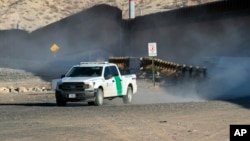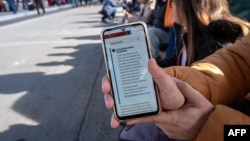On the first day of his second term, President Donald Trump announced a series of executive actions addressing immigration and border security.
Signing orders his officials called "common-sense immigration policies," the actions included declaring a national emergency at the U.S. southern border, deploying armed forces, finishing border wall construction, and ending asylum and birthright citizenship.
“We have a government that has given unlimited funding to the defense of foreign borders, but refuses to defend American borders or more importantly, its own people,” Trump said during his inaugural address.
In a call with reporters earlier in the day, Trump officials outlined the administration's plans to tackle what it describes as a "national security and public safety crisis" at the U.S.-Mexico border.
“President Trump was elected by a resounding mandate to carry out the promises he made on the campaign trail, that includes his pledge to secure the southern border and carry out the largest deportation of migrant criminals in history,” an incoming White House official said, speaking on background, a method often used by U.S. officials to remain anonymous. Officials also emphasized the administration's commitment to implement what they call the largest deportation of migrant criminals in U.S. history.
Here are some of the administration’s plans.
National emergency at the border
Trump said he will deploy the military to the U.S.-Mexico border, including the National Guard, to assist existing law enforcement officers. Officials emphasized that border security is national security, and the administration is committed to securing the border through use of the military.
“What this action does is it deploys armed forces [and] erects physical barriers by directing [Department of Defense] and [Department of Homeland Security] secretaries to finish the wall along the border. … We're going to reinstate the Remain in Mexico [policy],” the official said.
Aaron Reichlin-Melnick, senior fellow at the American Immigration Council, wrote on X that without Mexico’s permission, the promise to bring back Remain in Mexico is “just words on a paper.”
The Remain in Mexico policy, created during the first Trump administration, requires some asylum-seekers at the southern border to wait in Mexico until their hearings in U.S. immigration court.
Juan Ramon de la Fuente, Mexico's secretary of external relations, said in a news conference Monday morning that if "they reinstate [Remain in Mexico], this is something we don’t agree with. We have a different focus. We want to adjust it. ... The desire is to keep the same policies as now."
When asked about the number of troops expected to be deployed to the border, Trump administration officials said that decision would ultimately be made by the secretary of defense.
The administration is also rescinding the Biden administration border policies by giving U.S. Immigration and Customs Enforcement and U.S. Customs and Border Protection agents expanded enforcement authority and establishing federal task forces to work with state and local law enforcement in deportation efforts.
Mass deportations
Another announcement centers on undocumented immigrants across the country. The Republican president repeatedly promised during his campaign to carry out mass deportations, targeting at least 11 million undocumented individuals.
In the press call with reporters, the Trump officials said the administration will provide immigration officers with the necessary "authorities" to enforce existing laws. In his campaign, Trump vowed to eliminate President Joe Biden's deportation priorities, which targeted individuals with criminal records and those considered national security threats, and instead to expand enforcement to include all undocumented immigrants.
Stephen Yale-Loehr, a retired professor of immigration law at Cornell Law School, wrote in an email to VOA that mass deportation efforts and raids may get the most attention, but deportations will not increase rapidly right away.
“If a person already has an outstanding order of deportation, they can be deported immediately. But that is a relatively small number. Most people picked up will be put into deportation proceedings in immigration courts. Those courts already have a backlog of over 3.8 million cases. Given that backlog, it will be years before many people will find out whether they will be deported or allowed to stay based on asylum or some other form of protection,” he wrote.
Release of migrants
The incoming administration also announced an end to the practice of releasing migrants into the U.S. while they await their immigration court hearings, commonly known as "catch-and-release."
The Trump officials did not explain how they would handle an increase in immigrant detention.
Refugee program
Trump is also ending the refugee resettlement program. During his first administration, he progressively lowered the annual ceiling for refugee admissions to a historic low of 15,000 for fiscal 2021.
Refugee advocates said at the time the reductions marked a departure from the United States’ long-standing role in global refugee resettlement.
Erol Kekic, senior vice president of programs at Church World Service, wrote in an email to reporters that his group is urging President Trump to reconsider. Church World Service is one of the nine national refugee resettlement agencies authorized by the federal government to assist refugees in starting new lives.
“Even a brief pause in the program can have a devastating impact; on those displaced by violence and persecution, families separated by oceans and continents, and our communities who embrace the spirit of welcome inherent to our great nation,” he wrote.
Ending asylum and CBP One app
One of Trump’s orders calls for the immediate deportation of migrants who crossed the border illegally without a chance to plead their case to an asylum officer.
Shortly after Trump's inauguration, U.S. Customs and Border Protection posted a notice on its website saying the agency was no longer using the CBP One app, which had facilitated the legal entry of nearly 1 million people into the United States with eligibility to work.
The app allowed migrants to apply for an appointment to come to the border and apply for humanitarian parole or other forms of legal processing. The use of parole under the CBP One system was part of the Biden administration's broader efforts to manage migration flows and provide legal pathways to entry, rather than having individuals cross the border illegally.
However, parole granted through CBP One did not guarantee permanent legal status; it typically allowed individuals to stay temporarily and, in some cases, apply for work authorization while their immigration status was being reviewed.
The notice by the CBP One app also confirmed that all existing appointments had been canceled.
Birthright citizenship
Finally, Trump signed an order to eliminate birthright citizenship. Birthright citizenship grants automatic U.S. citizenship to anyone born on American soil, a right established by the 14th Amendment of the U.S. Constitution.
On Tuesday, a coalition of 22 Democratic-led states, the District of Columbia and the city of San Francisco filed a lawsuit in federal court in Boston. The lawsuit contends that Trump's attempt to eliminate birthright citizenship violates the U.S. Constitution.
This lawsuit was filed after others were filed by immigrant organizations and an expectant mother. The American Civil Liberties Union also filed a suit challenging the constitutionality of this executive order. Legal experts argue that the order violates the Citizenship Clause of the 14th Amendment and referred to the U.S. Supreme Court's 1898 ruling in United States v. Wong Kim Ark, which affirmed birthright citizenship.
Harrison Fields, White House principal deputy press secretary, told VOA: "Radical Leftists can either choose to swim against the tide and reject the overwhelming will of the people, or they can get on board and work with President Trump to advance his wildly popular agenda. These lawsuits are nothing more than an extension of the Left's resistance — and the Trump Administration is ready to face them in court."
A recent poll by The Associated Press-NORC Center for Public Affairs Research said most Americans think increasing security at the U.S.-Mexico border should be at least "a moderate priority" for the federal government.
Cody Wofsy, deputy director of ACLU's Immigrants' Rights Project and lead attorney in the ACLU case, wrote to reporters that the order seeks to create a permanent subclass of people born in the U.S. who are denied full rights as Americans.
"Every child in the United States should be born with the same rights as every other child," he wrote. "No politician gets to decide who among those born in our country is 'worthy' of citizenship."






